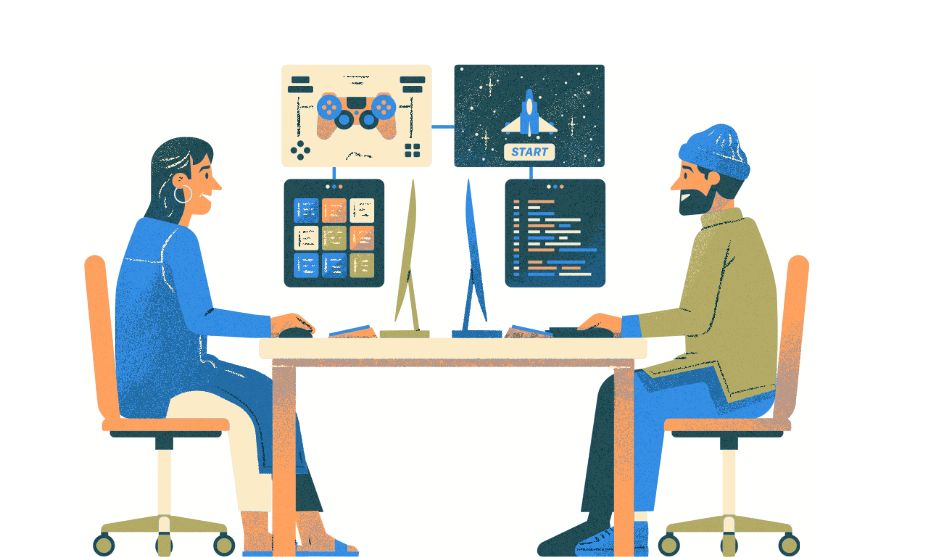Gaming has become one of the fastest-growing entertainment industries in the whole world. Its growth has created multiple job roles and a Game Designer is one of them. It’s an important job role that is a combination of both creativity and technical knowledge.
You see a lot of job postings and courses related to this field on the Internet. But what does a Game Designer actually do? The answer to this question demands analysis of multiple factors. That’s what I am going to do in this article.
I’ll cover basic details about this role and its responsibilities here.
Let’s start!
What is a Game Designer?
A Game Designer is a person responsible for overseeing the creative and technical aspects of a game production. These things are related to concepts, mechanics, characters, levels, design, etc. He uses his imaginative skills to analyze player psychology. They also need to work with several other professionals such as artists and developers.
What Does a Game Designer Do?
The answer to this question is simple yet it includes multiple conceptual and technical perspectives. When you hear about a “Game Designer”, the first thing that comes to mind is designing how a videogame will look like. Although it is also one of the responsibilities of this role, it demands a lot more than that. The overall work of this role depends on the nature of a development project.

Duties and Responsibilities of a Game Designer:
As an online game designer, you are supposed to be fulfilling the following duties and responsibilities:
Game Conceptualization:
Designers have to come up with an overall conceptualization of a game. It is one of their major job responsibilities. The word ‘conceptualization’ includes a lot of different things. It’s basically the entire development from things like ideas and design to challenges and rewards. The whole concept has to be creative, competitive, and most importantly, enjoyable.
Mechanics and technicalities:
The overall quality of a game depends on mechanics and technicalities. These professionals are also responsible for handling them. They check out things like character movements, combat systems, puzzles, etc.
They also have to set the difficulty on different levels according to the requirements. Please note that designers do not develop these things. They simply bring ideas and oversee these technicalities.
UI and UX Designing:
Besides mechanics, the user interface and user experience matter a lot as well. Designers are responsible for handling them as well. They create things like menus, UHD elements, etc. Their main focus while handling UI and UX is making it as user-friendly as possible. They try to make it more interactive, accessible, and engaging as well.
Communication and Collaboration:
Communicating and collaborating is another important role of a Designer. He’s not involved in many developing procedures but needs to guide the developers. Also,he has to communicate with the rest of the designers during project building.
Testing and approving:
Finally, once the game has been developed, designers test the prototype. They judge all the important factors such as gameplay, ease of use, etc., to find out errors and bugs. If everything’s okay, they approve the game. Please keep in mind that once the game has been launched, the designer still has to work for further updates and changes.
What are the Types of Game Designers?
Here are the details of these types:
- Gameplay designers: They are responsible for creating and handling gameplay mechanics.
- Level designers: Their responsibility is to create, maintain, and test different levels.
- Narrative designers: These experts handle the narrative and lore of characters and the overall game.
- System designer: They mainly take care of factors like progression system, rewards, and skill trees.
- UI/UX designers: their basic role is to design UI and UX to make a game more user-friendly.
- Sound designer: They handle the sound effects, voiceovers, and music.
Important Skills of a Game Designer:
I have listed these skills below:
- A deep understanding of game levels, layouts, and mapping.
- Ability to handle things by breaking them down into systems.
- Being able to use quantitative data to judge a design.
- Decent understanding of scripting languages and programming concepts.
- Basic understanding of 3D modelling and art.
- Ability to judge player requirements.
Conclusion
Game Designer is an important job role in the overall gaming industry. It’s a major role and people can get confused about the responsibilities related to it. As a designer, you’re supposed to handle a lot of different things. Usually, they specialize in these things to become more skillful.
These designers are responsible for conceptualizing and overseeing game development. They judge whether or not game mechanics and design are according to the requirements. Some professionals take care of sounds and prototype testing as well. There are a lot of skills required for such a role and some important ones are mentioned above.
FAQs
Is Game Design a high-paying job?
Indeed. An average designer makes around $117,000 a year in this field.
Do I need a certification to get this job?
Most probably. Usually, big industries require a certification for this job.
Do I need to learn coding to become a game designer?
Probably. A basic knowledge of coding is required for becoming a designer.
